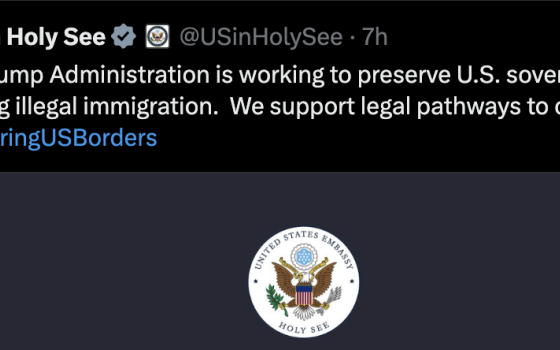ST. LOUIS -- As Catholic sisters from across the country were sequestered in meeting rooms Wednesday to discuss broad issues of the place of women and men in the church, specifically their relationships with bishops following a Vatican rebuke, five people stood outside the building.
Their focus was on issues familiar to Catholics: sexual abuse of minors, followed by denial and confusion.
For two of those standing outside the annual assembly of the Leadership Conference of Women Religious, however, the alleged abusers didn't wear clerical collars. They were Catholic sisters.
The group outside the assembly in the humid Missouri heat were representatives of the Survivors Network of those Abused by Priests, the leading advocate for victims of clergy sex abuse.
Among those holding signs with the group was Steve Theisen, SNAP's Iowa director, who drove five hours to take part in the event.
Theisen said he was abused by his fourth-grade teacher, a Catholic sister. He is calling on LCWR to sponsor a national audit of congregations of women religious to investigate the scope of possible abuse in their ranks.
Theisen said he first became involved with SNAP when he took part in a similar protest outside LCWR's annual assembly in 2003. He said his group has been asking since then to meet with LCWR's leaders to discuss their concerns but has been continually rebuffed.
Attempts by SNAP to discuss the issue with officials of the Council of Major Superiors of Women, another group that represents U.S. women religious, have also been rebuffed, he said.
This year, before the LCWR assembly, Theisen said, SNAP representatives hand-delivered a letter to LCWR president Franciscan Sr. Pat Farrell about the issue, but were told that the sisters' assembly was "not the venue" for the discussion, Theisen said.
The main business at this year's assembly of women religious is the Vatican's criticism of the group. Noting that, Theisen said, "If they're going to make a decision on that, they can make a decision on this."
Anne Gleeson, a St. Louis native, also stood outside the sisters' meeting. Gleeson said her eighth-grade teacher, who was a sister at the time, had abused her.
The abuse, Gleeson said, "just went on and on," even when other sisters in her alleged abusers community became aware of it.
"I'm really messed up by it all," Gleeson said.
During a press conference earlier Wednesday, LCWR was asked to address the issue of abuse by nuns and why the victims had not been given a hearing.
Dominican Sr. Rebecca Ann Gemma, who serves as a member of the leadership team of the Dominican Sisters of Springfield, Ill., said LCWR does not have the same type of power relationship with its membership that the U.S. bishops' conference has and is not able to dictate a single policy on how to investigate or handle abuse.
LCWR, she said, "cannot mandate to individual congregations" how they handle abuse. "The practices and the policies" regarding sexual abuse are done "congregation by congregation," she said.
But Gemma said there are also "many sisters who work with persons who have been sexually assaulted and abused."
"Women religious," she said, "are very much on the journey with those who are survivors."
Immaculate Heart of Mary Sr. Sandra Schneiders, a professor emerita at the Jesuit School of the Theology in Berkeley, Calif., said a key problem in assessing the alleged abuse is a lack of studies on the subject.
But, Schneiders said, "the problems that have existed among sisters, as far as anybody can tell ... are miniscule in comparison with the abuse issue among male professionals in the church."
Schneiders also said abuse by sisters was of a "radically different kind" than abuse by male clerics. "It tends to be excessive discipline ... or mistreating children," she continued, "which is really quite different from abusing children for one's own personal, sexual gratification."
St. Joseph Sr. Nancy Conway, who serves as a member of the congregational leadership team for the Congregation of St. Joseph, said in her 27 years of work as a consultant to orders of women religious, she has "been humbled by the experience of how I have perceived women religious handling the unusual circumstance of an accusation, in terms of its swiftness and its transparency."
During the SNAP event Wednesday afternoon, several sisters walked up to the victims to express compassion. One sister said she was "very sorry for your pain."
An advocate's reply to her: "I hope you bring it up at your meeting."
[Joshua J. McElwee is an NCR staff writer. His email address is jmcelwee@ncronline.org.]
NCR will be reporting on the LCWR assembly all week. Previous reports:
- Keynote: LCWR 'seed bed' for 21st century, Aug. 8
- LCWR 'gathers collective wisdom' of members to discern next steps, Aug. 8
- LCWR past presidents reflect on Vatican mandate, Aug. 7
- LCWR to determine course at next week's annual meeting, July 31
For related commentary see:
- The Vatican, LCWR, and Definitions of Dialogue By Kevin Aschenbrenner
- What LCWR teaches us about church leadership By Jamie L. Manson
- Are these sisters dangerous women? By Patrick T. Reardon
- The Second Vatican Council has already made us free By Robert Blair Kaiser


